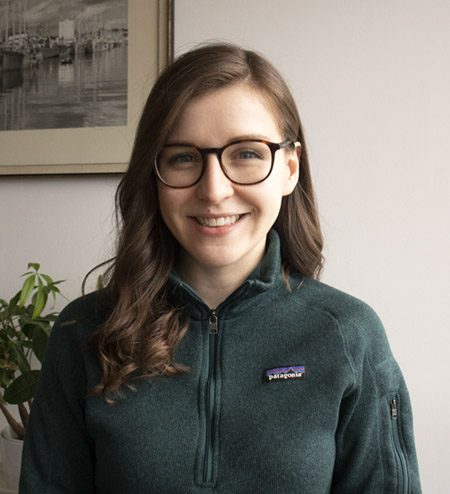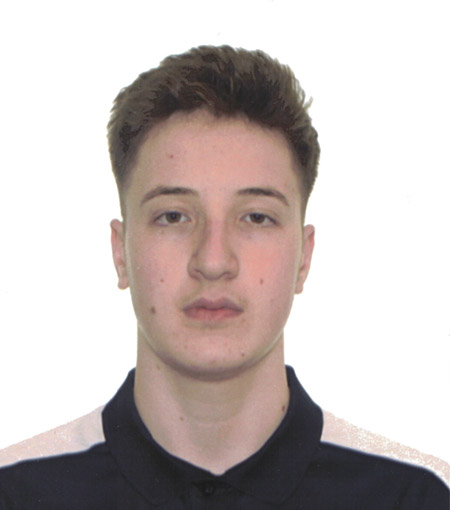Kayla Hollett and Liran Leidershnaider

Kayla Hollett
“This email could have been a meeting.”
In a world where most meetings could be emails, and most phone calls could be texts, Kayla Hollett is old-school. A mentor in the CPA Student Section Mentorship program since 2018, Kayla’s first couple of mentorships were conducted solely via email and instant-messaging apps. It was how her mentees felt most comfortable, and how they preferred to communicate, but Kayla says she still doesn’t know what her first few mentees looked or sounded like. When she signed up to be a mentor once more in 2022, one of her conditions was explicit – her mentee would have to be comfortable using an online video platform.
Liran Leidershnaider was happy to do so. Since the beginning of the pandemic, most of us have become much more accustomed to Zoom and Skype, and it suited him just fine to interact in this way. The benefits have been noticeable. Says Kayla,

Liran Leidershnaider
“We had bi-weekly meetings that were at least an hour where we had conversations with a lot of questions popping up all the time, and a lot of details to discuss. I also shared every single document and resource that I had with Liran and my other mentees on Google Docs so they had access to all of it. I couldn’t do that in the earlier years of the program, it was more a surface-level answer to a quick question here and there. I think our relationship on Zoom is more efficient, and going forward that’s the way to go. You know, you come in to a meeting with one question and that leads to five more. Every time Liran emails me I think ‘we could have a meeting about this’.”
Liran is just starting his fourth year of the Specialized Honours Bachelor of Science Psychology Program at York University. He grew up in a medical family, and from his childhood he was surrounded by discussions about psychology. This piqued his interest at an early age to understand why human beings behave the way they do. In high school, he took a human development course which reaffirmed his decision that psychology was the career path for him. His goal now is to one day work with patients as a clinical psychologist.
TAKE FIVE WITH Kayla Hollett and Liran Leidershnaider
What is the psychological concept (bystander apathy, confirmation bias, that sort of thing) that blew you away when you first heard it?
Liran: “When I heard about the placebo effect in high school, I was fascinated! Just the way you can make someone think something without it being actually there, is really incredible. I remember watching Grey’s Anatomy at the time, and they had a clinical trial where they gave one group of participants a pill that actually had a function, and gave the other group of participants the placebo, and the placebo group of participants showed some improvement in the clinical symptoms of their disorder! It fascinates me that we can make our brain believe in anything we want, or even make our brain think in a way that makes us better. I think it kind of validates how important psychology is for our mental health and our daily lives in general.”
Kayla: “For me it was the Flynn effect. I was in class and we talked about it – it has to do with the fact that IQ scores are increasing in the general population over decades, from the beginning of IQ testing until now. I was so fascinated by it because I couldn’t figure out how. I went to my psychology prof’s office to ask him what he thought caused it – I was very curious, and the textbook didn’t have those details. It was my curiosity about the Flynn Effect that made me start to realize psychology may be my career path of choice.”
You can listen to only one musical artist/group for the rest of your life. Who is it?
Kayla: “As a female millennial, I think I have to say Taylor Swift. But it works because she’s amazing! Her most recent two albums Folklore and Evermore I can sing along to every word of every song.”
Liran: “It’s got to be Pink Floyd. My dad used to always play them in the car, and I used to play guitar so I’d ask him about this melody or that one. They still have some of the best guitar melodies.”
Do you have a sport? What is it and do you watch, play, follow it?
Liran: “Competitive swimming. I came to Winnipeg when I was six, and since then I’ve been swimming at a provincial level, mainly at the University of Manitoba. Then when I moved to Toronto in 2013 I started swimming competitively at the North York Aquatic Club. I’ve stopped because of COVID unfortunately.
Kayla: “I strength train in my spare time. Weightlifting at the gym!”
If you could spend a day in someone else’s shoes who would it be and why?
Kayla: “I think anyone who is considered a highly successful person on a global scale. Not that I support everything they say or do, but someone like Elon Musk who runs a ton of businesses. I want to know how he manages his time! As a psychology trainee I also think it would be interesting to get inside his mind.”
Liran: “I want to be in my own shoes, but in 20-30 years time. I’m very curious as to where I’ll be in life, what I’ll be doing. Here I am now with my big aspirations and plans for the future – what will that look like in 20 years?”
If you could become an expert at something outside psychology, what would it be?
Liran: “A veterinarian. I love animals, and having two cats myself, I know how important pets are to their owners. Speaking from experience, pets have their own relaxing effect on humans, whether it’s them greeting you when you come home from somewhere, or just sitting beside you while you work. So, being able to treat animals is something that I know would have a positive impact on the pet’s owner too, and would in turn bring me joy as well.”
Kayla: “I think a physiotherapist. With strength training sometimes injury or pain comes with that. It would be so much easier if I could do physiotherapy on myself! It would also allow me to interact with people all day, which is something I gravitate towards.”
Kayla has the same career goal of working as a clinical psychologist. She is just starting the third year of her Ph.D. in Clinical Psychology at Concordia University, having completed her Master’s in Experimental Psychology at Memorial University in her home province of Newfoundland. She became interested in the biology of the brain in high school, but didn’t yet know what psychology was. She started her academic career in biology so she could study the brain. A year in, she took a psychology course as an elective and realized that perhaps this was the path she should be taking. “I went to my psych professor and said, in a bit of a panic, that I thought I was in the wrong program. He said I should switch over, I did, and I started to learn about all the different career paths available through psychology. I realized I wanted to be a therapist, to do clinical work, and now I’m super glad I made the switch.”
Sometimes, deciding on a career path is the easy part. Navigating that career path comes with many more challenges. Kayla identified with this during her undergrad degree, when she started to look into grad school herself. She says she could really have used a mentor in the same field.
“I didn’t have a formal mentor, as such, but I did have a couple of graduate students in my lab who could answer questions. But there were a couple of gaps – they hadn’t necessarily applied to the same programs that interested me (clinical) so it would have been really handy to have known someone who had applied to clinical psychology Ph.D.s. I ended up kind of navigating it myself, working together with other applicants. I applied twice, in two cycles. The first cycle I was so overwhelmed that I was able to apply to only two programs. The process is a course in itself, and it was such a steep learning curve. You’re in the fourth year of your undergrad, you’re trying to do your honours thesis along with everything else. It’s pretty overwhelming. I like to think of that time as a practice cycle, which made it easier when I applied again two years later. I really needed that practice given how much goes into the application process.”
At that time the CPA Student Section Mentorship program was not yet in full swing. In the past few years, it has become an enormously useful program for the students who participate – in large part because of that overwhelming process of graduate school applications. Liran says that Kayla’s mentorship has helped him in many ways, and that the application process is one of the biggest.
“I was an incoming third-year student last year. I knew I wanted to apply to grad school, and becoming a clinical psychologist was my career aspiration. I came in pretty knowledgeable about how to get into graduate school, but still needed information about many important details regarding how to do everything right, and Kayla knows well that I had a lot of questions. Kayla was really approachable, made sure all my questions were answered, and was readily available when I needed her. I felt really comfortable asking all the little questions which might have seemed silly. Now I feel excellently prepared, and full of the knowledge I’ve obtained over the course of this past year.”
Liran’s progress has been such that Kayla nominated him for Mentee of the Year with the CPA Student Section. Not only academic success and professional competence, but his personal growth has been a source of great pride for Kayla.
“Any undergrad who wants mentorship is excellent for that reason alone. Liran is exceptional because of his incredible growth. I saw him start off at one place, and at the end I saw him almost as a new person. Even when I see him today, speaking so professionally and ably, I’m just proud! I’m seeing him grow into an academic in front of my eyes.”
Kayla, of course, could not have seen Liran grow in front of her eyes had they not interacted via video – which makes the connection that much more rewarding. They have both applied to the mentorship program once again this year, and they hope to be paired with one another once more. They have both grown to appreciate the interaction and breadth of discussion their meetings provide, and they look forward to maintaining their connection and partnership.
The future for both of these young students is bright – well-lit, with a clean background, crisp audio, and a good internet connection.
